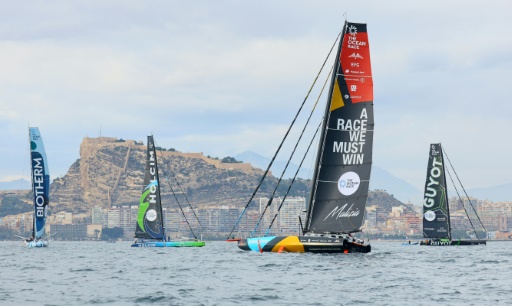
Ocean Race: Imocas are ready to run marathons around the world
Five Imoca crews, monohulls from the Vendée Globe, set off on Sunday in Alicante (Spain) to start the Ocean Race (formerly the Volvo Ocean Race), the Marathon of the Seas that will finish in July in Geneva (Switzerland), a 7-stage term attempt.
“It is a historic moment for sea racing because, on the one hand, we have the French culture at the Vendée Globe and on the other hand Anglo-Saxon sailing,” exulted Antoine Mermaud, head of the class.
The longest sailing race on the planet, The Ocean Race, which was born in 1973 under the name Whitbread Round the World Race, has revealed or confirmed the presence of exceptional skippers since its inception, such as New Zealanders Peter Blake and Grant Dalton and American Paul Cayard.
It later became Volvo Ocean Race, bought in 2018 by two Swedes, Johan Salen and Richard Precious, and renamed The Ocean Race. For the first time, the Imoca, the Vendée Globe’s famous sailboat, will be the stars.
“It’s our first chance to see these boats sail at full power as a crew,” said Phil Lawrence, race director since 2016.
An international epic
Starting at 1:10pm GMT (2:10pm French time) on Sunday, these five sailboats and the five sailors on board – including at least one woman – will wage a merciless battle across the world’s most inhospitable seas.
From Alicante, the runners will head to Cape Verde, then Cape Town (South Africa), Itagai (Brazil), Nieuwpoort (USA), Aarhus (Denmark) and The Hague (Netherlands) before finishing their trip to Geneva.
A 32,000 nautical mile (60,000 km) epic that can come to an abrupt halt when material breaks or after a collision with a cetacean, submerged container or small iceberg in the Great South Seas.
With 12,750 miles to cover in the South Seas – a record for an ocean race – for nearly a month of navigation, it’s the third leg of The Ocean Race, between Cape Town (South Africa) and Itagai (Brazil), that worries Alicante’s pontoons the most. .
The fleet consists of the Malizia team piloted by German Boris Herrmann, the American team 11th Hour Racing team captained by Charlie Enright, three French teams – Guyot Environment-Team Europe piloted by Benjamin Dutreux, Biotherm piloted by Paul Meilhat and Holcim – BRB piloted by Kevin Escoffier, who He competed in the race twice.
human adventure
“It’s a very long race and trying that the key lies very much in the man. We’ve been living in a small space and difficult conditions for six months. We have to help each other in the event and above all have fun,” commented Paul Millhat.
“I’m sure we’ll have some great races with fast and impressive boats as well. We’ll go to cities that have never seen so many monocoques fly and I think they’ll be very happy to see us do some + said Kevin Escoffier.
The five Imocas were initially equipped with flails, these side appendages that allow the boat to rise above the water and spin at insane speeds. All sailboats are in position to win ahead of Sunday’s kick-off.
“We all have different origins, and with this boat it will be about finding the best way to use it and also to fit everyone in the cockpit,” laughs Annie Loesch (Guyot Environment-Team Europe), a former British Olympic sailor. for the third time.
The start of this race, which usually takes place every three years, has been postponed twice due to the Covid-19 pandemic. The last edition, contested in 2017/2018, was won by the Dongfeng (China) team, led by French leader Charles Caudrelier, after 126 days of racing.

“Proud explorer. Freelance social media expert. Problem solver. Gamer. Extreme travel aficionado.”
